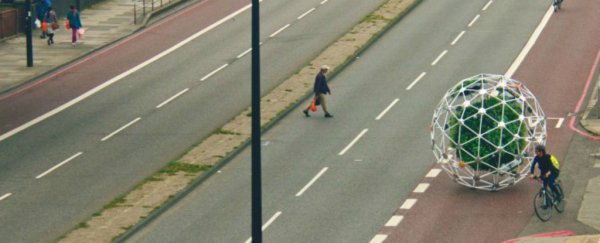As anyone that lacks a green thumb will know, keeping plants alive is hard work. Unlike most living things we deal with on a daily basis, many of the plants we select for our homes and gardens can't fend for themselves - it's up to us, the caregivers, to find them the right amount of sunlight or to water them just enough to keep them healthy.
Well, all that could be about to change, because architects have found a way to give plants the power - put them in an autonomous 'cyber garden', and let them find their own resources.
The odd-looking project, dubbed 'Hortcum machina, B', was created by William Victor Camilleri and Danilo Sampaio from the Bartlett School of Architecture at the University College London. It uses a series of sensors to monitor a planet's electro-physiology, which basically gives them a primitive form of 'intelligence', reports the team.
"Its core of twelve garden modules, each carrying native British species on outwardly-extending linear actuators allow the structure to become mobile by shifting its centre-of-gravity," the team says. "Electro-physiological sensing of the state of individual plants collectively and democratically controls decision-making of the orientation of the structure and its mobility."
In other words, the garden can roll around until its electro-chemistry sensors discover an environment that's ideal for its survival. Then, if conditions remain the same, it can stay put, and move on to a new location later on when resources dwindle.
Right now, the team hasn't released much info on how this new gardening system could assess resource availability in other areas, but figuring that out could have huge potential for things way beyond gardening.
As the team puts it: "In the near future, context of driverless cars, autonomous flying vehicles, and seemingly endless other forms of intelligent robotics co-habiting our built environment. Hortum machina B is a speculative urban cyber-gardener."
Does this mean that we will one day have a field full of rolling gardens? No one knows, but it sure would be an awesome sight.
